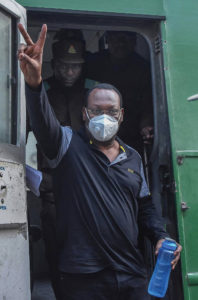by Ben Taylor
On July 21st, Freeman Mbowe, the leader of Tanzania’s largest opposition party Chadema, was arrested. The arrest took place at 2.30am at his hotel in Mwanza, hours before Mbowe was due to speak at a conference calling for constitutional reforms. Ten other party members, including some holding leadership positions, were also arrested.Mbowe was charged five days later. He appeared before Kisutu Magistrate’s Court where he was charged with conspiracy and the provision of funds to commit terrorist acts under Tanzania’s Economic and Organized Crime Control Act and its Prevention of Terrorism Act, respectively. As these are terrorism-related charges, Mbowe does not have the right to apply for bail under Tanzania’s Criminal Procedure Act.
Prosecutors explained that the charges do not relate to the constitutional reform forum Chadema had planned to hold in Mwanza, but to alleged offences dating from 2020 in another part of the country.
“Moments like this take Tanzania a step backwards,” said James Mbatia, leader of the NCCR-Mageuzi opposition party. “The president’s wisdom is needed so that we move forward,” he added.
The international community were also alarmed at developments. “We have expressed our concern about the treatment and imprisonment of the opposition leader Mbowe,” said Victoria Nuland, US Under-Secretary for Political Affairs. Nuland was speaking at the end of a visit to Tanzania during which she met President Samia Suluhu Hassan and the Minister of Foreign Affairs, Liberata Mulamula, as well as opposition leaders, part of a tour of several African countries.
Human rights group Amnesty International called on the Tanzania government to “substantiate the charges” against Mbowe or to release him. “His arrest and continued detention appears to be a tactic to silence critical voices as part of a growing crackdown against the political opposition,” they added.
On the occasion of his first court appearance, in early August, riot police broke up a demonstration by Mbowe supporters. They held banners “Mbowe is not a terrorist” and “Free Freeman Mbowe”.
“Freeman Mbowe, parliamentarian for 15 years, leader of the official opposition in parliament for 10 years and head of the largest legal opposition party for 17 years is not a terrorist,” said Tundu Lissu, Chadema’s deputy chairman.
Amid tight security, the trial at the high court in Dar-es-Salaam opened on August 31st. Most journalists were banned from the courtroom by police.
The government had warned foreign diplomats against turning up to the court to follow the case without notifying the foreign ministry, citing Covid-19 regulations and security concerns. Nevertheless, representatives from the British High Commission and US Embassy were present at the hearing, which was also attended by Chadema’s senior leaders.
Chadema have described the case as a throwback to the repressive era of President Magufuli, and said it represented the loss of hope that the new President would sweep away many of her predecessor’s restrictions on democratic political activity.
In a pre-trial hearing, Mbowe’s lawyers had argued that his initial arrest and detention had been unlawful, as he and his co-accused had been held for five days without being charged or being able to see his lawyers. “They told the court that they were tortured and humiliated and forced to record such statements,” said Mbowe’s lawyer, Peter Kibatala, after the hearing. He added that “These were not voluntary statements.” The court dismissed these objections and allowed that the trial should proceed.
Chadema has said prosecutors accuse Mbowe of conspiring to attack a public official, and of giving 600,000 Tanzanian shillings ($260/220 euros) towards blowing up petrol stations and public gatherings and cutting down trees to block roads.
STOP PRESS: As the trial began in early September, Regional Police Commander for Kinondoni (Dar es Salaam), Ramadhani Kingai, told the court that Freeman Mbowe had sought to recruit retired or expelled army commandos to carry out acts of terrorism in various part of Tanzania. He claimed that Mbowe and a group of others were planning to blow up fuel stations and markets and block vehicles on highways so that they could conduct robberies. He also claimed that the alleged criminal group planned to carry out these acts in the run up to the 2020 general election, with the intention of showing that Tanzania was ungovernable.
At the time of writing, the case has been adjourned to allow for a hearing on whether statements taken from the accused outside the 8-hour time limit for cautioned statements should be admissible.

